Much LOVE and happiness may be found in the New Orleans Museum of Art’s wonderful Sculpture Garden…
…but sometimes most fun can be had while sitting on the grass in a circle of friends.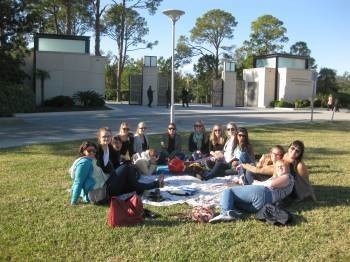
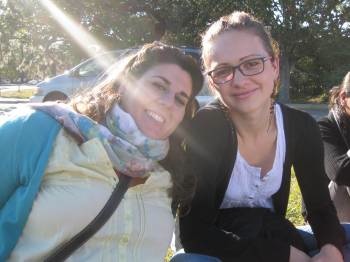
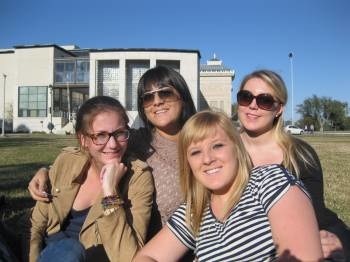

Much LOVE and happiness may be found in the New Orleans Museum of Art’s wonderful Sculpture Garden…
…but sometimes most fun can be had while sitting on the grass in a circle of friends.



According to the American Dietetic Association children should eat 6-11 servings of grains (bread, pasta, rice, cereal), 3-5 servings of vegetables (about 1/2 cup is a serving for a child), 2-4 servings of fruit (again, about 1/2 cup), 2-3 servings of meat, poultry, fish or dried beans, and 2-3 dairy servings every day.
However, experts agree that children will eat when they are hungry and shouldn’t be forced to eat. Give children small portions which won’t overwhelm them, and remind them that they can always have more.
Snacks between meals should be nutritious (fruits, vegetables, cheese, bread, crackers, yogurt, or juice).
Keep fruits and vegetables at children’s eye level in the refrigerator or in a bowl on the table so they will be able to take them easily when they are hungry. Blend juice, chopped fruit and yogurt in the blender for a quick and delicious fruit smoothie. Add a touch of honey to sweeten.
Involving children in meal planning, grocery shopping and food preparation can help them to become more interested in what they eat. Have them cut out pictures from grocery store flyers to make a picture shopping list, and then they can help find the items in the store. Help them to choose foods in each of the five food groups listed above. Serve food in a pretend restaurant with homemade placemats and menus, or create your own grocery store with empty boxes or cans (if you plan on using cans, open from the bottom and then check for sharp edges).
Many children need to eat more often than three times per day. If a child becomes cranky or irritable, it may be time for a snack. Sugary foods make many children excitable.
Food safety:
• to avoid choking, never offer food unless the child is sitting upright.
• toddlers are just learning to chew – celery, carrots, grapes, apples, and hot dogs must all be cut up, peanut butter should be spread thinly on bread or a cracker, and children under four should not eat raisins, hard candy, nuts or popcorn, as they are all easy to choke on.
• food storage customs in the United States may be different from those in other countries. Generally, eggs, dairy products and all meats should never be left at room temperature. If meat is frozen, it should be defrosted in the refrigerator or in the microwave, not on the counter. All cutting boards and knives should be well washed after preparing chicken. Fruit will ripen at room temperature, but if it is already ripe, it will keep better in the refrigerator. The one exception is bananas – the refrigerator will turn them black.
• before opening a can, rinse the lid so the dirt from the outside of the can doesn’t get into the food.
Remember, adults should set a good example with the food they eat, and where and how they eat it.
Dear host families,
Many of our new au pairs have joined the cluster recently. They’ve absorbed much information during the four days of orientation in Stamford and equally much upon arrival at your home.
To help them perform their duties in the most efficient manner, it may be helpful to review instructions more than once, especially those related to school, such as:
For au pairs who drive children to and from school it is very important to know:
Hope everybody has a happy and safe new school year,
Jolanta
Au pairs are looking forward to participating in Children’s World’s Fair at Louisiana Children’s Museum. They will share their cultures through poster presentations, displays of cultural items and souvenirs, country fact sheets, games, story readings, music and more. Countries represented will include Germany, Bolivia, France, Austria, South Africa, Australia, Poland, Costa Rica and Brazil.
Date: March 10, 2012.
Hours: 10 am – 5 pm
Location: 420 Julia Street
Please come and join us in celebrating world’s cultures!

Adventure Quest was abuzz with activity and au pairs enjoyed watching tikes scramble into bumper cars, but for themselves they chose a more sedate activity at their favorite establishment – Starbucks.
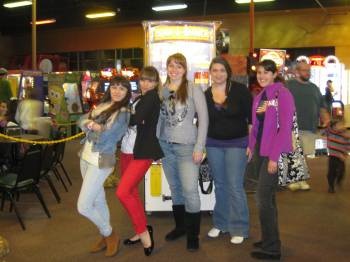
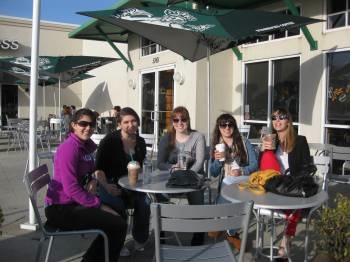
To find out more about educational opportunities in New Orleans and get a closer look at an American college campus, au pairs visited Tulane University.
They saw lecture halls and sports facilities, watched students toss ball in the quad, checked out the Tulane Victory Bell at McAlister Auditorium Plaza, and stopped at the Newcomb Art Gallery to view Prospect.2 exhibition.
It would be fun to study at Tulane, they decided.
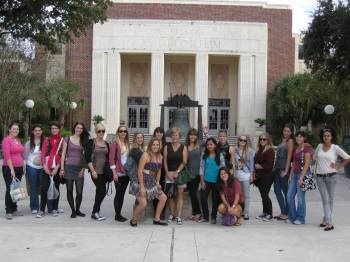
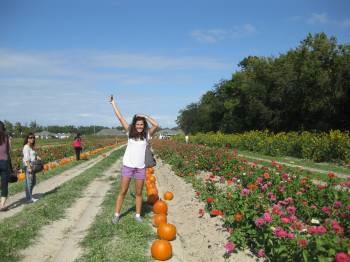
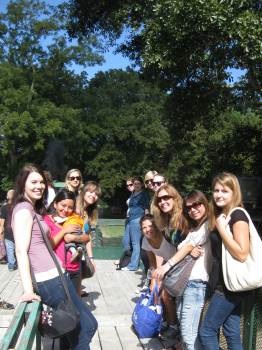
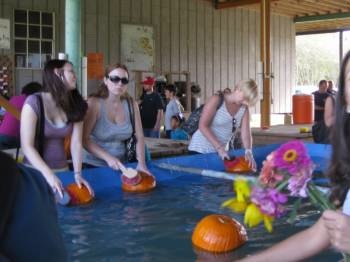
Alligators, herons, turtles and raccoons were just some of the animals au pairs had a chance to observe while traversing the Manchac swamp with the Cajun Pride Tours.
A lively and informative commentary, in both English and French, by the guide, and a visit from a baby alligator made for a fun and interesting outing.
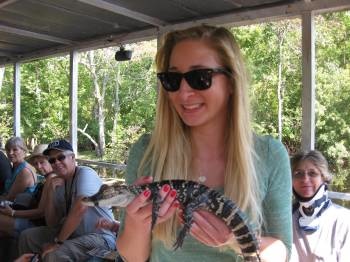
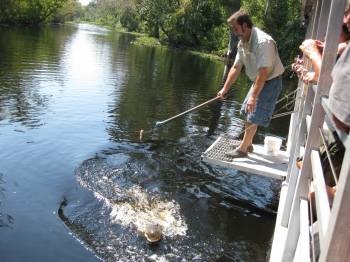
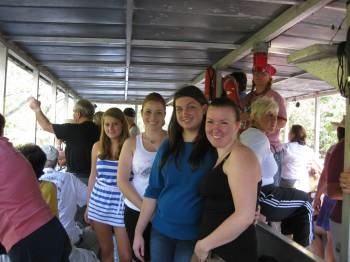
With their host families, tour companies, friends, or all by themselves, au pairs love to travel across the United States. This summer, Laura decided to leave hot and humid New Orleans for a vacation in Alaska. She said her experience was “awesome” and we can well believe, judging by her pictures.
(As per the Department of State rule, each au pair gets two weeks of paid vacation during the one-year-long match with her host family.)


The most crucial step that a host family and au pair must take to avoid problems is to talk to each other often and honestly! This point cannot be over-emphasized. Many families and au pairs have found out that a small problem had grown to major proportions simply because it had not been discussed in a timely manner.
(APIA guidlines for a successful year…)